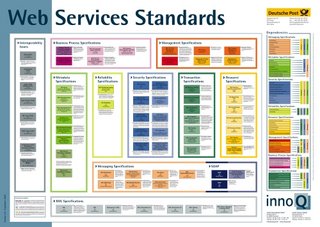Here goes . . .
- Even the day coders will run screaming from WS-*. The battle is won; we night coders killed it because we didn't want to be controlled by vendor-pires and it is fundamentally flawed technology. Sadly, even though I believe that it is dead, it will take 2 more years before the industry echo chamber comes to terms with it. Software vendors who are heavily invested in WS-* will spend 2007 doing two things: one last gasp at making WS-* happen and quietly writing their Plan B MRDs.
- REST usage will increase in lieu of WS-*, but it won't unseat messaging and other middleware.
- People will settle down a tad about Ajax. It's great and all, but I've been seeing more and more botched impls. Like just about everything, its just a tool not a dogma.
- XML will finally be considered one tool in the tool chest just like every other technology. Development teams will only use XML where it actually adds value and not force it into places where it does not belong.
- The virtualization march will continue.
- Distributed Cache and JavaSpace usage will accelerate as more people grok the power of this architecture style.
- Apache River will breathe new life into Jini/JavaSpaces. Both will see lots of new interest and implementations. 2007 will be a "rebuilding year" (as they say in sports) - 2008 will be the big year for a Jini/JavaSpaces come back. Someone from Sun will formally apologize to all the people maimed by J2EE in 2009 and acknowledge that they should have marketed Jini as a service technology from the beginning (ok just kidding that isn't going to happen).
- The Open Source patent war will begin in earnest.
- Community Source Software will slowly start to take off in industry verticals as more executives grok the possibilities and come to terms with the fact that they are already sharing industry vertical software with their competitors; they just don't have access or any control of the source code. Look for a success or two in 2007 which will set the stage for a pandemic by 2009.
- Even more smart people will start blogs or at least start reading blogs which result in even more transparency and open collaboration between software vendors, customers, and consultants and ultimately better software, more innovation, and less waste.








